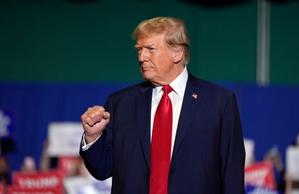America
The Republican Coalition of Asian Americans presents reasons for endorsing Trump.

April 12 :
Since the community's beliefs and ideals were more in line with those of the GOP, some prominent Indian American Republicans urged members to publicly endorse Donald Trump's presidential campaign.
Dr. Sudhir Parikh, chairman of Parikh Worldwide Media and Padma Shri recipient, Sridhar Chillar, and Hemant Bhat were the three principal speakers and founders of the Asian American Republican Coalition (AARC) who addressed the audience at a meeting held by the AARC on April 8, 2024, at the ITV Gold auditorium in Edison, NJ. Sanjiv Pandya presided over the gathering.
As Dr. Parikh recalled, he has been an active and dedicated Republican for many decades, but he has been particularly active since the 1992 Bush administration, when he and a small group of other Indian American Republicans contributed $4 million for the campaign.
"This was during a period when our community was quite small and economically struggling, but we were driven by our belief in this philosophy," Dr. Parikh explained. Everyone, regardless of party affiliation, needed to "be very active" in mainstream politics if they wanted a slice of the American pie, he said. When asked why he voted Republican, he cited the party's emphasis on hard labour, adherence to conservative social and family values, and entrepreneurial spirit as reasons. According to him, Republicans hold a firm belief in the importance of businesses. "Becoming our own boss is something we like doing; teaching our children to be successful people is something we like doing as well...." In Dr. Parikh's opinion, Indian Americans lean more towards Republican ideology than Democratic one. We are a Super Power, and that is something else the United States understands. This country must maintain its status as a superpower. Therefore, we must always have a president who is resolute and unyielding, capable of standing up against bullies. When it comes to confronting nations that pose a threat to Western culture and the economy, I believe that only the Republican Party is capable of doing so.
"We all came as legal immigrants, and we are for immigration, but we don't want illegal immigration," he further argued. On top of that, Indian Americans are eager to lend a hand to those in need, but they are wary of "giving away without qualifications - (for anyone) to get used to subsidies from government."
After 50 years of watching politics, he concluded that Republicans are more sympathetic to India than Democrats. And it's clear that Donald J. Trump will support India, which is great news for both our country and the Motherland, Dr. Parikh added.
One of the AARC's founders, Hemant Bhat, mentioned recruiting members from all around the United States to the Republican party in his address. He stated, "And today’s America is not like what we used to see earlier,” in reference to the many issues that the United States has been experiencing. Overhead, there are gloomy clouds. Concerns about people' safety, increasing prices, inflation, and the fact that "America has no border" were all things he brought up.
There was "safety, the stock market was booming, and America was considered a leader" four years ago, according to Bhat, who argued that life was different under Trump's government.
The meeting between President Trump and the North Korean leader occurred when the United States "was able to take on China" and "America was considered a Super Power," as he pointed out.
The voting trends, according to Sridhar Chillara, demonstrated how a relatively tiny constituency, such as Indian Americans, may sway the national vote and determine the next president. About 25% of the population identifies as Asian. Why are we unable to unite? If only 2.5 million people—or 10% of the total—band together, we can choose the president. We are incredibly powerful.
The key, according to Chillara, is to win over a sizable Asian population and enlighten them about the Republican Party and the principles it stands for. He pointed out that many people in the community now openly identify as Republicans. His thoughts on the lawful immigration of Indians to the United States were similar to those of Drs. Parikh and Bhat. The merit-based immigration system is something we are familiar with. Nobody on the opposite side is on board with it. Anyone from the southern border is welcome to come and apply for citizenship, according to them. Is it just? What do you think about it? "Why?" Bhat asked.



































